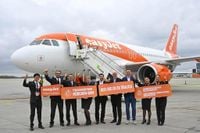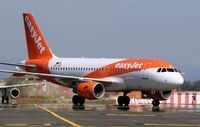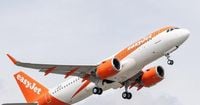British low-cost airline easyJet is making significant strides in expanding its operations in Italy, launching five new routes from Rome's Fiumicino Airport as part of a broader strategy to bolster its presence in the country. This expansion, announced on April 1, 2025, includes new flights to Frankfurt, Hamburg, Munich, Zurich, and Brussels, which will increase the airline's capacity at Fiumicino by an impressive 35% compared to last year.
With these new routes, easyJet is set to operate a total of 16 routes from Rome, creating approximately 150 new jobs in the process. "The opening of the new base at Fiumicino is a milestone in strengthening our presence in Italy," said easyJet CEO Kenton Jarvis. The expansion comes at a time when the Italian capital is gearing up for the Jubilee, a Holy Year for Roman Catholics, which is expected to attract around 32 million tourists in 2025, according to the Vatican.
In addition to the new routes from Fiumicino, easyJet is also strengthening its presence at Munich Airport, launching a new route between Munich (MUC) and Rome-Fiumicino (FCO). This route will be operated twice daily, with departures scheduled at 09:40 and 17:25, starting March 30, 2025. With this addition, easyJet now serves six destinations from Munich: Rome, Naples, Milan Malpensa, London Gatwick, Manchester, and Edinburgh. This expansion not only enhances travel options for business and leisure travelers but also reinforces easyJet's commitment to growth in Germany.
Moreover, easyJet is opening bases at London Southend, Milan Linate, and Rome Fiumicino airports, as it plans for moderate capacity growth this summer. The airline is increasing its overall seat capacity by around 2% this year, with a focus on flights to non-EU markets such as North Africa and Turkey, as well as popular beach destinations. During a media briefing marking the restoration of operations at Southend on March 31, 2025, Jarvis noted, "The booking environment looks okay," indicating a positive outlook for the airline's growth.
At Southend, easyJet is basing three A320neos, which will enable the airline to offer longer-range destinations. The expansion in Italy at Fiumicino and Linate follows easyJet's acquisition of remedy slots released by Lufthansa and ITA Airways, allowing the airline to secure European Commission approval for ITA Airways' acquisition by the Star Alliance carrier group. At Linate, easyJet is basing five aircraft, three of which are wet-leased from ITA, and serves 22 routes from this location.
Jarvis emphasized easyJet's commitment to its core markets, including Milan Malpensa and Naples. However, this rapid expansion in Italy may pose challenges for other airlines operating in the European Union's third-largest economy, particularly Ryanair, which has dominated the domestic market. Ryanair CEO Michael O'Leary expressed skepticism about easyJet's ability to compete on fares, stating, "They're simply taking over routes that were previously operated by ITA. The tickets will be modestly less expensive than ITA." Despite this, Ryanair's traffic in Italy is expected to rise by about 8% this year, increasing from 60 to 65 million passengers.
The competitive landscape in Italy is evolving, with easyJet's growth strategy potentially reshaping the market dynamics. The airline's focus on expanding capacity and routes aligns with the increasing demand for air travel, especially as tourism in Italy is set to surge in the coming year. The Jubilee celebrations and the influx of tourists present a unique opportunity for easyJet to solidify its presence in the region.
As easyJet continues to expand its operations, the airline faces not only opportunities but also challenges from competitors like Ryanair, which remains a formidable player in the market. The ongoing adjustments in capacity and route offerings reflect the airlines' strategies to adapt to the changing travel landscape.
In summary, easyJet's latest announcements underscore its commitment to growth in Italy and Germany, as the airline seeks to capitalize on the rising demand for air travel. With new routes, expanded capacity, and job creation, easyJet is positioning itself as a key player in the European aviation market, navigating the challenges and opportunities that lie ahead.






